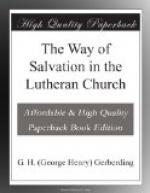We object finally that, at the experience meetings, held in connection with modern revivals, not only novices, as described above, but those who have been the veriest profligates, are encouraged to speak, and are at least permitted to recount and seemingly glory in their former sins. They do not speak as Paul did, when compelled to refer to his former life, with deep sorrow and shame, but often jestingly, flippantly, and as if they imagined that they ought now to be looked upon and admired as great heroes. We believe that this is all wrong, and productive of great harm. The unconverted youth, listening to such talk, says to himself, “Well, if such a person can so suddenly rise and be looked up to and made a teacher of others, a leader of the experience and prayer-meeting, certainly I need not be uneasy; for I have a long way to go before I get as far as he was.” Therefore, we object to all such conduct. It is not only unscriptural, but unbecoming. It is an offense against good breeding and common decency. It does great harm.
But enough. We might still speak of the spirit of self-righteousness engendered and fostered by this system. We might speak of the sad results that follow with so many—how that persons become excited, have strange sensations and feelings, imagine that this is religion, afterwards find that they have the same old heart, no strength against sin, no peace of conscience, none of that bliss and joy they heard others speak of and expected for themselves, and how they gradually fall back into their old mode of life, become bolder than ever, and at last drift into hopeless unbelief, and say: “There is nothing in religion; I’ve tried it, and found it a delusion.” Thus is their last state worse than their first. We might show that in sections of country where this false system has held sway, worldliness and skepticism abound. These places have been aptly called “burnt districts.” It seems next to impossible to make lasting impressions for good on such communities.
We might speak of the proselyting spirit that so often accompanies this system. How with all its protestations for charity, brotherly love, and union, it often runs out into the meanest spirit of casting aspersions on others and stealing from their churches. We might speak of the divided churches that often result. As Dr. Krauth once forcibly said, “They are united to pieces, and revived to death.” We might point to the divided households, to the destruction of family peace, to the many sad heart-burnings and alienations that result. But we forbear. The whole system is an invention of man. It is unscriptural from beginning to end. We cannot conceive of our blessed Saviour or His apostles conducting a modern revival. The mind revolts at the idea.
CHAPTER XXVI.
MODERN REVIVALS, CONCLUDED.
We have given a number of reasons for refusing to favor or adopt the modern revival system as a part of the Way of Salvation. We would now add the testimony of others, not only of our own communion, but also of other denominations.




